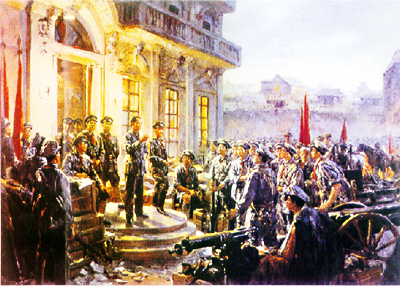Nanchang uprising

The Aug. 1 Nanchang Uprising, often referred to as the Nanchang Uprising, or Aug. 1 Uprising, was an armed resistance led by the Chinese Communist forces on Aug. 1, 1927 in Nanchang, Jiangxi province, in order to counter the anti-communist purges by the Kuomintang (KMT, or Nationalist Party of China). The military forces were under the leadership of Communist Party of China (CPC) members Zhou Enlai, Tan Pingshan, Ye Ting, Zhu De and Liu Bocheng, and He Long, who joined the Party after the event. The Soviet Army military adviser M. F. Kumanin from the 20th Army was also among the leaders.
On Aug. 1, 1927, the first shots of the armed resistance against the Kuomintang reactionaries were fired by the CPC and the left-wing KMT, lifting the curtain for CPC on independently leading the armed struggle and creating the revolutionary army.
At 2 am on Aug. 1, Zhou Enlai, He Long, Ye Ting, Zhu De and Liu Bocheng commanded their troops to attack and occupy the city of Nanchang, which marked the beginning of the Nanchang Uprising. Immediately, Wang Jingwei gave his instruction to Zhang Fakui and Zhu Peide, ordering them to make an attack upon Nanchang. Facing the counter-attack, the uprising army withdrew from Nanchang on Aug. 3 to look for further forces and foreign aid, according to their original plan made by the Central Committee of the CPC.
Finally, under the command of Zhu De and Chen Yi, the army moved to the borders of Fujian, Guangdong, Jiangxi and Hunan and took part in the uprising in southern Hunan with a remaining regiment of 800 people. In April 1928, they arrived at the revolutionary base area Jinggang Mountain and joined the Autumn Harvest Uprising forces that Mao Zedong led.
Aug. 1, 1927 marked the birth of a new armed force independently led by the CPC.
 0
0 







Go to Forum >>0 Comments